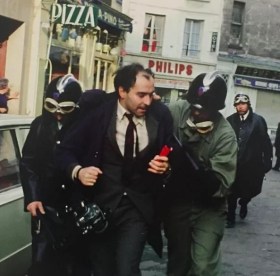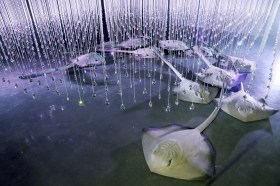Conversations around the First Nations arts sector often turns to empowering language such as agency, self-determination, Aboriginal-led, sovereignty and advocacy – but what do these words mean in practice – on the ground, on Country?
A good demonstration is the work that Desart have been doing since the early 1990s, in particular its Aboriginal Art Worker Program, which was established in July 2008 to strengthen business and technical skills development across its member art centres.
It creates understanding in that nexus of how things are done culturally, and the skills needed to run an arts business today, helping to negotiate industry partnership, to know about workplace rights and obligations, and offering curatorial workshops.
The program has led to the emergence of the Desart Photography Prize, which enters its tenth year in 2021 and has the means to develop both technical and creative skills.
Carmel Young, Program Manager at Desart, told ArtsHub: ‘The Desart Photography Prize has always been a much-anticipated event for Aboriginal art workers, artists and collectors of photography.
‘Photography is such an important element of an art worker’s duties: documenting artworks for cataloguing, artists’ portraits for provenance certification, as well as capturing the day-to-day activities in an art centre, particularly for social media,’ she continued.
Art Worker Program Manager Marlene Chisholm, who has been the driving force for the Prize, said the Desart Photography Prize is about celebration too.
‘The Prize empowers Aboriginal people to be behind the lens rather than being observed. For artists it provides another avenue for cultural expression.’
‘Each year the Desart Photography Prize celebrates country, community, family and art centres. It is important to celebrate our achievements and the positives in life,’ she told ArtsHub.
‘The Prize empowers Aboriginal people to be behind the lens rather than being the observed.’
Marlene Chisholm
Not only do the images express personal experiences, they provide an opportunity to convey opinions on national and universal politics and demonstrate that Aboriginal people are aware of, affected by, and are part of global political movements.
‘Participating photographers provide us with an intimate insight into their community lives captured with a sense of comfort and familiarity that may only be conveyed by one who belongs,’ she added.
You can view past Photography Prizes on the Desart website, and winners of the 2021 Desart photography prize will be announced in September.
Advocacy takes many forms
Another prize that has a strong advocacy and professional development role is the Vincent Lingiari Art Award (2016, 2019), presented in partnership with the Central Land Council and Tangentyere Artists.
2021 will be the third year it will be staged. Taking its cue from the 50th anniversary of the Wave Hill Walk Off, led by the award’s namesake Gurindji leader Vincent Lingiari, and the 40th anniversary of the Aboriginal Land Rights (NT) Act 1976, the prize offers artists a moment for sovereign expression.
Desart CEO Philip Watkins said: ‘The Vincent Lingiari Art Award provides an opportunity for artists to present a work that responds to the given theme, which as you can tell has a strong political direction, we’re currently developing that theme for 2021 and we will make that announcement soon.’
‘Rights to land is fundamental to the social, religious, economic and political identity of Aboriginal peoples’ in the NT, explains Desart’s website.
From the milestone moments to the everyday, advocacy also takes many forms as the Central Desert community recovers from COVID-19.
Developed by Desart in partnership with the Central Land Council, the Desart Resilience Project provides NT members with a range of assistance stimulating growth and recovery following the impacts of COVID-19.
Watkins explained: ‘Desart’s own research shows the impact on the arts and cultural sector nationally, and for art centres in remote communities the situation is even more challenging as they try to meet community needs, sustain their enterprises and negotiate market uncertainty.
‘The central purpose of this project is to ensure Aboriginal artists and art workers and their enterprises have a strong future.’
To learn more about:
- Desart’s Aboriginal Worker Program
- The 2021 Desart Photography Prize
- The Vincent Lingiari Art Award
- For Desart Resilience Project contact the Desart team.
Desart the peak body for 35 Aboriginal owned and operated Arts and Crafts centre based in Mparntwe, Alice Springs.





